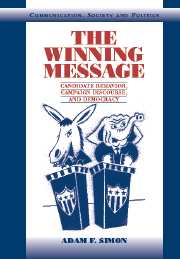Book contents
- Frontmatter
- Contents
- List of Figures
- List of Tables
- Acknowledgments
- 1 Introduction
- 2 Dialogue: A Standard for Campaign Discourse
- 3 Understanding Campaigns: Background, Theory, and Methods
- 4 The Ventriloquist's Hand: A Game-Theoretic Model of Campaigns
- 5 Duck or Punch? Dialogue in a California Gubernatorial Election
- 6 Dialogue and Its Effects in Contemporary American Elections
- 7 Explaining and Predicting the Occurrence of Dialogue
- 8 Conclusion: Toward More Substantive Campaign Discourse
- Appendix A Analysis of the Model of Campaigns in Mass Elections
- Appendix B Experimental Procedures
- References
- Index
1 - Introduction
Published online by Cambridge University Press: 18 November 2009
- Frontmatter
- Contents
- List of Figures
- List of Tables
- Acknowledgments
- 1 Introduction
- 2 Dialogue: A Standard for Campaign Discourse
- 3 Understanding Campaigns: Background, Theory, and Methods
- 4 The Ventriloquist's Hand: A Game-Theoretic Model of Campaigns
- 5 Duck or Punch? Dialogue in a California Gubernatorial Election
- 6 Dialogue and Its Effects in Contemporary American Elections
- 7 Explaining and Predicting the Occurrence of Dialogue
- 8 Conclusion: Toward More Substantive Campaign Discourse
- Appendix A Analysis of the Model of Campaigns in Mass Elections
- Appendix B Experimental Procedures
- References
- Index
Summary
Observers of American elections regularly bemoan the lack of substance in contemporary political campaigns. However, while the need for substance has been clearly articulated, the remedy is not so apparent. Meanwhile, a sea change in the conduct of American politics continues to increase the public's dependence on campaigns for political information. The traditional competition between parties has evolved into a clash of candidates. This clash increasingly occurs over the airwaves and through other means of direct contact, largely at the expense of previous mechanisms that mediated contact between politicians and the public. For voters, the campaign is the proximate source of information about the candidates and the most immediate influence on their decision. For candidates, the campaign offers the best opportunity to hear the public's voice, to clarify long-term goals, and to establish immediate political priorities. Thus, the lack of substance alarms citizens and scholars alike and underscores the importance of an investigation of the dynamics supporting substantive campaigns. In what follows, I attempt to expose the roots of this problem and then to isolate the factors that either elevate or debase campaign discourse.
My examination is built around a minimal standard for normatively acceptable campaigns, called dialogue. Simply put, dialogue means that when one candidate raises a subject, his or her opponent responds by discussing the same subject. The opposite of dialogue is ignoring, responding by discussing a different subject.
- Type
- Chapter
- Information
- The Winning MessageCandidate Behavior, Campaign Discourse, and Democracy, pp. 1 - 7Publisher: Cambridge University PressPrint publication year: 2002
- 1
- Cited by

